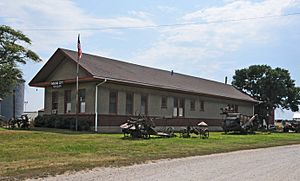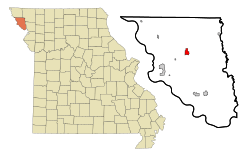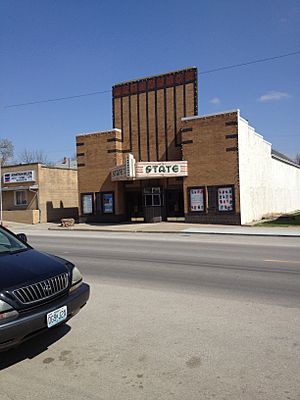Mound City, Missouri facts for kids
Quick facts for kids
Mound City, Missouri
|
|
|---|---|

Mound City Museum, housed in a former C.B.& Q. Railroad depot
|
|

Location of Mound City, Missouri
|
|
| Country | United States |
| State | Missouri |
| County | Holt |
| Township | Benton |
| Area | |
| • Total | 1.25 sq mi (3.23 km2) |
| • Land | 1.25 sq mi (3.23 km2) |
| • Water | 0.00 sq mi (0.00 km2) |
| Elevation | 961 ft (293 m) |
| Population
(2020)
|
|
| • Total | 1,004 |
| • Density | 805.78/sq mi (311.22/km2) |
| Time zone | UTC-6 (Central (CST)) |
| • Summer (DST) | UTC-5 (CDT) |
| ZIP code |
64470
|
| Area code(s) | 660 |
| FIPS code | 29-50312 |
| GNIS feature ID | 2395113 |
| Website | http://www.moundcitymo.com/ |
Mound City is a small city located in Holt County, Missouri, United States. It is found near where Interstate 29 and Missouri Route 118 meet. In 2020, about 1,004 people lived there.
Contents
A Look at Mound City's Past
Mound City was first started in 1857. It was originally called North Point. The city's current name comes from the natural hills, or "mounds," found near where the town was built.
A post office named North Point opened in 1855. Later, in 1871, the name of the post office and the city officially changed to Mound City.
Where is Mound City Located?
Mound City is in the northwest part of Missouri. It sits at the southern end of an area called the Loess Hills. These hills are what gave the city its name.
The city covers about 1.29 square miles (3.34 square kilometers) of land. There is no water area within the city limits.
How the Land Became Part of Missouri
In the early 1800s, the area where Mound City is now was considered unorganized territory. In 1836, leaders from the Iowa, Sauk, and Meskwaki Native American groups sold this land. This sale was part of a large land deal known as the Platte Purchase.
Important Natural Areas Nearby
Mound City is close to the Loess Bluffs National Wildlife Refuge, which is about 5 miles away. This refuge is a protected area for wildlife. It helps the city's economy.
Many visitors come to the refuge, especially during the spring. This is when over a million snow geese migrate through the area. These visitors, including hunters, bring money to the local businesses. The refuge is estimated to add about $2.6 million to the economies of Holt and Buchanan counties. Hunting is not allowed inside the 7,500-acre refuge itself. However, it is permitted in the corn fields surrounding the refuge where the geese feed.
Who Lives in Mound City?
| Historical population | |||
|---|---|---|---|
| Census | Pop. | %± | |
| 1880 | 678 | — | |
| 1890 | 1,193 | 76.0% | |
| 1900 | 1,681 | 40.9% | |
| 1910 | 1,575 | −6.3% | |
| 1920 | 1,472 | −6.5% | |
| 1930 | 1,525 | 3.6% | |
| 1940 | 1,606 | 5.3% | |
| 1950 | 1,412 | −12.1% | |
| 1960 | 1,249 | −11.5% | |
| 1970 | 1,202 | −3.8% | |
| 1980 | 1,447 | 20.4% | |
| 1990 | 1,273 | −12.0% | |
| 2000 | 1,193 | −6.3% | |
| 2010 | 1,159 | −2.8% | |
| 2020 | 1,004 | −13.4% | |
| U.S. Decennial Census | |||
According to the 2010 census, there were 1,159 people living in Mound City. Most residents were White (96.1%). A small number were Native American (2.4%), Asian (0.7%), or African American (0.2%). About 1.1% of the population was Hispanic or Latino.
The average age of people in Mound City was 46.3 years. About 20% of residents were under 18 years old. Many people, about 25.5%, were 65 years or older.
Local News and Learning
Media in Mound City
The local newspaper in Mound City is called the Mound City News. It has been published every week since April 1994.
Education Opportunities
Public schools in Mound City are managed by the Mound City R-II School District. The city also has a public library, the Mound City Public Library, where people can borrow books.
Famous People from Mound City
- Jake Schoonover (NCAA Football Coach) – He is a Special Teams Coordinator at the University of Mississippi.
- Frank McGrath (1903–1967) – An actor known for his role in the TV show Wagon Train.
See also
 In Spanish: Mound City (Misuri) para niños
In Spanish: Mound City (Misuri) para niños
 | Chris Smalls |
 | Fred Hampton |
 | Ralph Abernathy |


